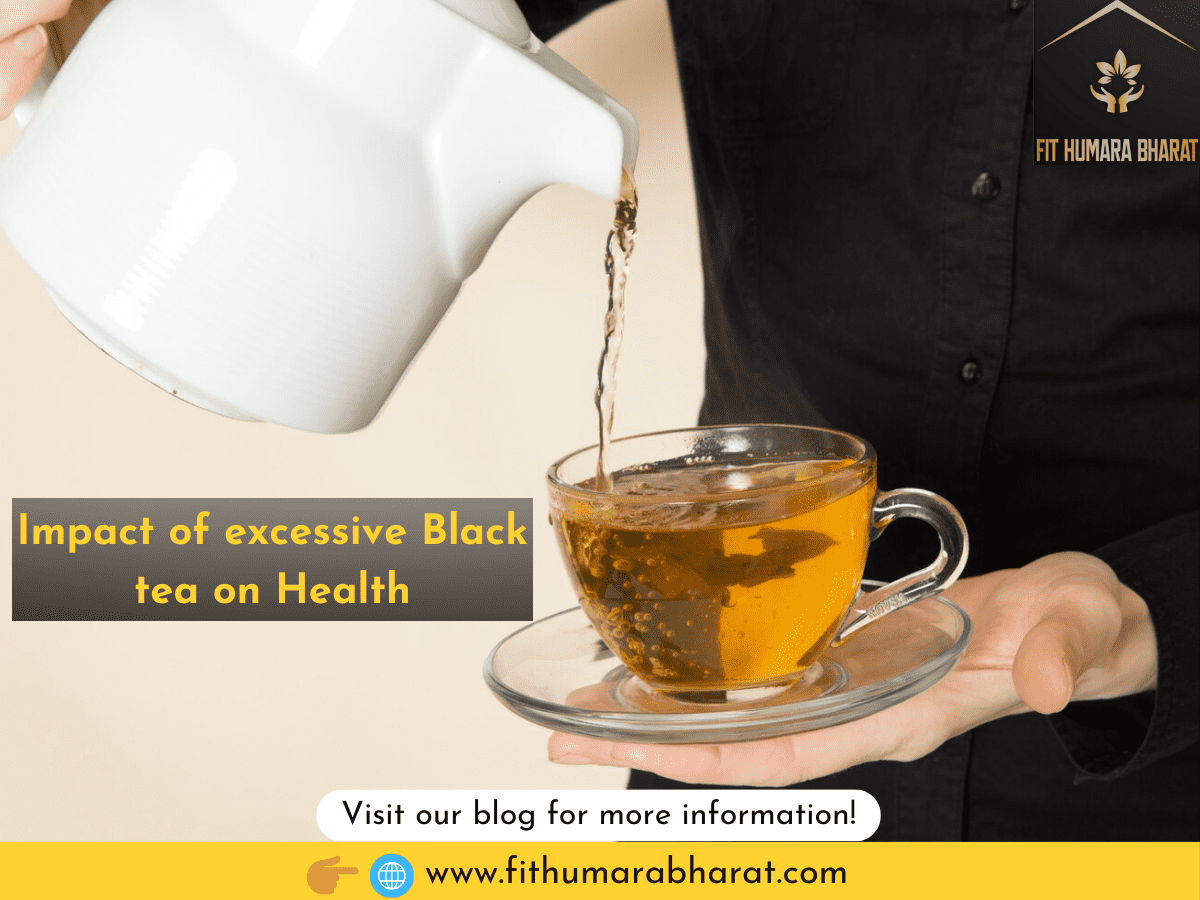Black tea is an essential drink. A lot of people around the world can’t live without it. They love how strong it tastes and how warm it makes them feel. On the other hand, having too much black tea can hurt your Health in various ways.
Let’s talk about how drinking too much black tea can harm your health, breaking down challenging health ideas into terms that are easier to grasp.
Exactly What Does “Black Tea” Mean?
We will start by discussing what is black tea and how it works. Camellia sinensis plants are also the source of green and white tea. Their uniqueness comes from the way they are made. Black tea leaves taste different and make them darker because they are fully oxidized. Putting the tea leaves on fire also changes their chemicals, which is terrible for your Health.
How much black tea is “Excessive” in a day ?
The amount of black tea considered excessive can vary depending on individual factors such as tolerance to caffeine, overall health, and sensitivity to stimulants.
However, generally speaking, consuming more than 4-5 cups (about 400-500 milligrams of caffeine) of black tea per day may be considered excessive for most adults.

Black Tea’s Appeal
To some extent, black tea is good for you. Other antioxidants, like flavonoids, help the body fight reactionary stress. Chronic diseases like heart disease and some types of cancer are less likely to happen to people who take these vitamins. Additionally, black tea has caffeine in it, which can assist some individuals in concentrating and provide them with further energy.
However, bad things happen when people drink too much black tea. Allow us to consider what might occur:
1. Caffeine Overload:
Black tea has coffee, a natural stimulant that can make you feel good or bad. An average person can handle a small amount of coffee without getting sick, but drinking too much can cause several problems.
It might be tricky if you want to sleep and drink too much black tea incredibly late at night. Meaning you may not be able to sleep or have bad sleep habits. An increased heart rate and blood pressure can happen if you drink too much coffee. People with heart problems should avoid this.
Stressed, anxiety, and tense people may find it hard to relax or focus after drinking a lot of coffee. Some people have stomach problems after drinking coffee because it makes them pee more, which can dry them out. More trips to the bathroom can give some people diarrhoea or worsen stomach problems.
2. Dehydration:
Caffeine in black tea can make you pee more, which can help you lose water. If people drink the right amount of water, they probably will stay hydrated, but if they drink too much and don’t drink enough, they can become dehydrated over time. Being dehydrated can make you thirsty, have a dry mouth, get headaches, and feel tired. It could even get so bad that you need to see a doctor.
3. Teeth damage and stains:
There are chemicals in black tea called tannins that can hurt and stain teeth. To make teeth look dull and yellow, the tannins in black tea can stain them if you drink a lot. Over time, black tea’s acidity can eat away tooth enamel. Because of this, cavities and other oral issues are more likely to happen.
4. Trouble absorbing Iron:
Studies show that tannins and flavonoids in black tea might make it harder for the body to take in iron from plant-based foods that are not heme. More quickly than heme iron from animal goods is absorbed by the body, non-heme iron follows suit. Iron deficiencies can worsen in people who don’t get enough iron from their food or need more iron, like pregnant women. This is because tannins can stop iron from being taken.
5. Bone health:
Some people think that having too much black tea could be bad for their bones. Few studies have found a connection between the oxalates in black tea and calcium in the body. This might stop the body from getting calcium, making people more likely to get osteoporosis or break a bone, especially if their bones are weak.
6. Problems with the intestinal tract
Some people can have stomach issues when they drink a lot of black tea. Problems like bloating, gas, and acid reflux are on this list. That’s because black tea is acidic and has caffeine in it, which can hurt the stomach walls and make stomach problems like gastritis or peptic sores worse.
7. The chance of turning to dependence:
Caffeine can make you dependent or hooked if you drink a lot of black tea every day. Since your body may get used to more caffeine over time, you may need higher and higher doses to feel the same effects. Eventually, people may need black tea to stay awake or to avoid withdrawal symptoms like headaches or feeling tired.
8. Trouble falling asleep:
If you drink black tea in the afternoon or evening, it might be hard to fall asleep. Because caffeine in black tea makes it hard for your body to calm down and fall asleep, you may feel sleepy when you wake up. It can be hard to fall asleep after drinking too much black tea because sleep is good for your health and well-being in general.
9. Blood pressure and heart rate going up:
People who are sensitive to caffeine may experience a brief rise in heart rate and blood pressure if they drink too much black tea. This affect is generally mild, but people who already have heart problems or high blood pressure should be careful about how much black tea they drink to keep these problems from getting worse.
Some health benefits come from having black tea in small amounts, but too much of it cannot suit you. Black tea can make you sleepy and nervous, dehydrate you, hurt your teeth, and make it hard for your body to absorb nutrients.
Tips for drinking Black Tea
- Choose high-quality tea.
- Use water around 200-212°F (93-100°C).
- Steep for 3-5 minutes.
- Allow the leaves to flare fully.
- Pair with food for a great experience.
- 1 or 2 cups of black tea daily is reasonable for most people to drink.
- Stay hydrated with water alongside tea.
So, watch how much you drink to be happier and healthier.
Thank You
- Molecular evidences of health benefits of drinking black tea
- Black tea–helpful or harmful? A review of the evidence
- Regular consumption of black tea increases circulating kynurenine concentrations: A randomized controlled trial☆
- Effect of Black Tea Consumption on Urinary Risk Factors for Kidney Stone Formation
- A Six-Month Randomized Pilot Study of Black Tea and Cardiovascular Risk Factors


 ? Tips for Safe Drinking
? Tips for Safe Drinking

 Sources
Sources